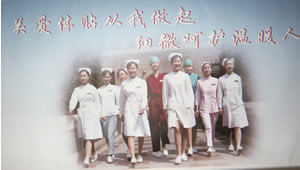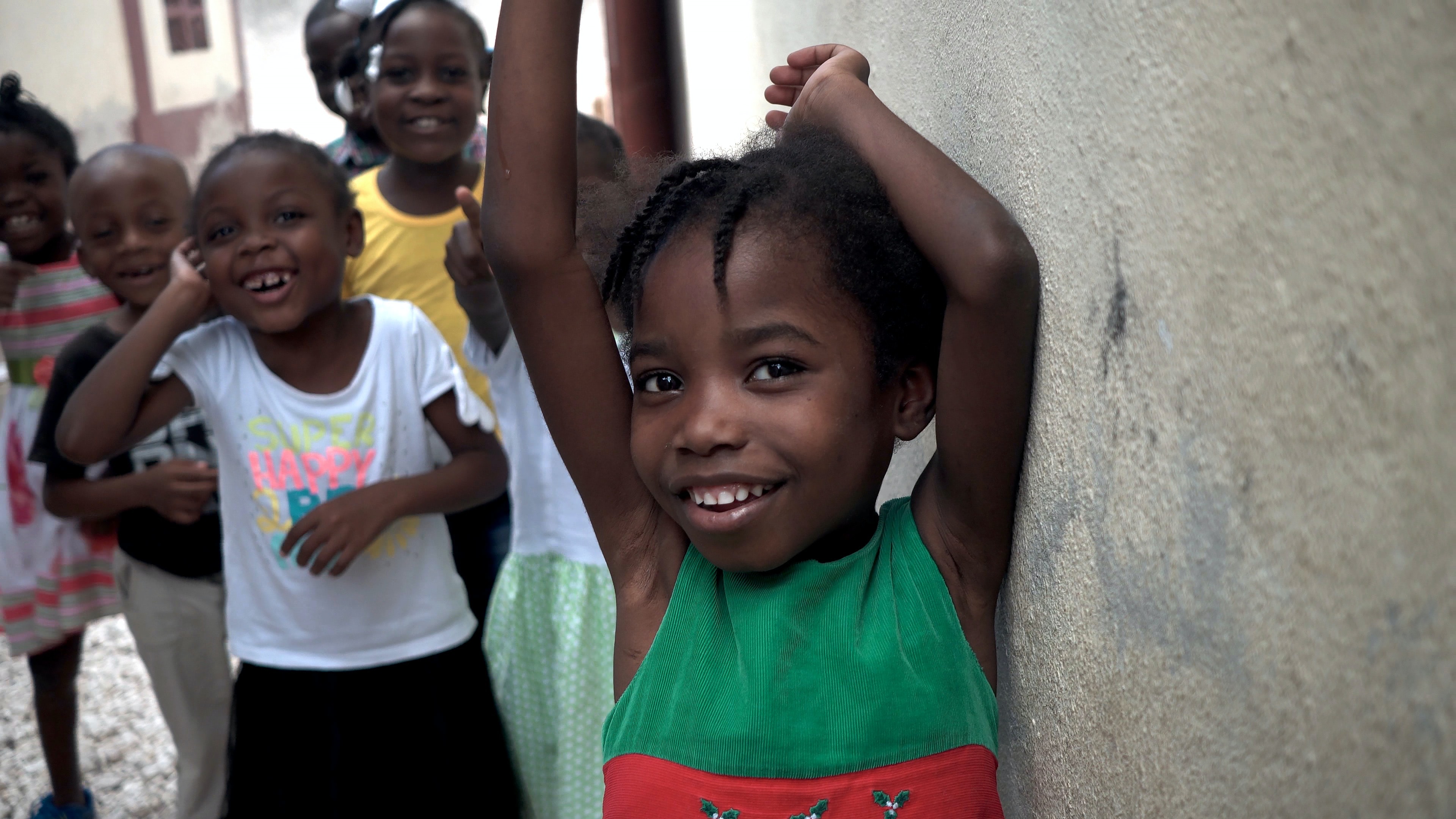Feature: Where in the World is Hopkins Nursing? | Next Section >
Through collaborative education efforts, the Johns Hopkins University School of Nursing is working with other colleges and universities around the globe to create nursing education opportunities in the international community.
Peking Union Medical College, Beijing, China: As in many countries throughout the world, China is experiencing a shortage of nurse educators. The country lacks the doctoral-level nurse education programs that prepare these leaders, and nurses who seek a career in higher education, research, and administration must go abroad for their education.
 In Beijing, China, nursing faculty from Peking Union Medical College (PUMC) and Johns Hopkins are working together to prepare Chinese nurses as higher education leaders in nursing, nursing research, and health care administration. Their goal is to bring to China and its health care system an internationally recognized, doctoral-level model for Chinese nursing education.
In Beijing, China, nursing faculty from Peking Union Medical College (PUMC) and Johns Hopkins are working together to prepare Chinese nurses as higher education leaders in nursing, nursing research, and health care administration. Their goal is to bring to China and its health care system an internationally recognized, doctoral-level model for Chinese nursing education.
“Having doctoral nursing education in China will greatly expand the country’s nursing knowledge and capabilities,” says Victoria Mock, DNSc, AOCN, FAAN, director of the JHU/PUMC program. “When nurses no longer have to leave China for doctoral training, they are more likely to remain in the country to establish their career. The entire country benefits from the research, teaching, and practice of doctorally prepared nurses.”
Mock met with PUMC administrators in May, and has played a key role in planning the curriculum for the school’s PhD candidates. Students begin the program by taking courses in Beijing, some of which are taught by faculty members from Hopkins. This fall, Mock spent six weeks teaching at PUMC. She was joined by Hopkins nursing faculty members Marie T. Nolan, DNSc, RN, and Linda C. Pugh, PhD, RNC, FAAN.
Next fall, the first cohort of doctoral students from PUMC will arrive in Baltimore for a six-month course of study at the Johns Hopkins University School of Nursing. Candidates will then return to China for approval and initiation of their China-based doctoral research. Upon graduation from PUMC, these nurse leaders are expected to remain in China and, in ongoing collaboration with the school, to serve as nursing education faculty, researchers, and administrators.
American University of Beirut School of Nursing, Beirut, Lebanon: The year 2005 marked 100 years of nursing education at the American University of Beirut (AUB), Dean Martha Hill, PhD, RN, FAAN, a member of the AUB School of Nursing International Advisory Board for the Centennial Celebration, was a keynote speaker at the school’s Centennial Nursing Conference in July.

Five months later, two other Hopkins nursing faculty members returned to Beirut. Lori Edwards, APRN, BC, MPH, and Gayle G. Page, RN, DNSc, FAAN, were there to present at the Centennial Celebration’s Closing Ceremony, but the festive occasion was abruptly marred by the car bomb assassination of journalist and parliament member Gibran Tueni, one of Lebanon’s most outspoken anti-Syrian leaders.
“This seems to be their life story,” says Edwards. “The nurses in Beirut had to survive the Lebanese civil war [1976-1993] and aggression from Syria and Israel, and they are still continuing to suffer these devastating losses.” The entire country was in shock and mourning in the following days. “The AUB faculty was worried about us, but we were more worried about them,” says Page. “The entire city was engulfed in what one colleague described as a ‘Sad Anger.’ We got more of an education visiting Beirut than we’d bargained for.”
Two days after the assassination, Edwards and Page each presented at the closing ceremony, though the occasion was now somber. Earlier the same day, Tueni’s funeral was held in Beirut, and over one million people assembled for a peaceful protest in the center of city. Meanwhile, at the AUB School of Nursing, Page spoke on the implications of inadequate pain management, while Edwards addressed the connections between research, teaching, and patient care when conducting community-based participatory research.
Despite the devastating events during the visit, the faculty from Hopkins and AUB laid the foundation for collaboration beneficial to both schools of nursing. Edwards will help write a proposal to develop a Center for Community-Based Care at AUB, helping to shape the future of the school’s community health initiatives. And Page is exploring ways to assist AUB faculty in conducting scientific research, an important step in the formation of doctoral programs for both medical and nursing students at the school. Additionally, a student exchange program is being developed, in which students from AUB will visit the Johns Hopkins University School of Nursing. Hopkins also anticipates sending students to AUB Medical Center and the School of Nursing for a variety of learning experiences.
The visiting Hopkins faculty have confidence that AUB will continue to move forward and meet its goals for growth in the coming years. “I have no doubt that the AUB School of Nursing will succeed,” says Page. “Even in the face of tragedy, the school’s faculty—and particularly Director Huda Abu-Saad Huijer—have a palpable determination and hopefulness that they are going to make it through.”
University of Maribor College of Nursing Studies, Maribor, Slovenia: In Eastern Europe, Johns Hopkins University School of Nursing faculty member Patricia Abbott, PhD, RN, FAAN, FACMI, has been facilitating collaboration with Dean Dusanka Micetic-Turk and Peter Kokol, associate dean for research at the University of Maribor College of Nursing Studies, to establish graduate programs for nurses in the country of Slovenia. Slovenia, as part of the former Yugoslavia, is now a member of the European Union (EU). The country has worked diligently to raise the standards of nursing practice and education according to the EU’s Bologna process, which creates a common framework for the national higher education systems in Europe. Now that this has been accomplished, Dean Turk and Kokol are embarking on an ambitious journey to bring graduate level education to the country of Slovenia.
Presently, all Slovenian nurses with a master’s or doctoral degree have been educated in a foreign country-most in the United Kingdom. But the University of Maribor, one of three universities in Slovenia that offer college-level nursing education, wants to develop its own nursing teachers and researchers. Together, the Hopkins and Maribor nursing schools have been exploring the use of distance education techniques for global nursing education and discussing the intersections of health care and information technology.
The first of these distance education initiatives was developed last summer with the assistance of Helena Blazun, a Hopkins pre-doctoral fellow and a master’s student at the Faculty of Economics and Business, and assistant in the College of Nursing Studies at the University of Maribor. Blazun spent the summer of 2005 working with Krysia Hudson and Patricia Abbott to create “The Virtual Teaching Assistant.” This fully web-based approach will assist students, both in Baltimore and Maribor, to learn foundational computer and information competencies essential to health care education.
When Blazun returned home, Abbott visited Slovenia, lectured on nursing informatics, and provided her consultation services for program development. Shortly thereafter, Abbott was asked to deliver a keynote address for the newly created Croatian Nursing Informatics Society in April 2006. For Abbott, this invitation is the first evidence that as graduate nursing education takes root in Slovenia, it will trickle down through Croatia, Bosnia, and the other Balkan states.
“As the University of Maribor develops its first graduate nursing programs, they are integrating informatics and computer science skills into the curriculum,” says Abbott. “They are young, they are smart, and the passion that I witnessed, from the Rector to the assistants, speaks to me of a group destined for success.”
 Global Service Learning: Guatemala
Global Service Learning: Guatemala From Baltimore to Vellore, India: Global Support for Nurses Struggling with COVID-Related Mental Health
From Baltimore to Vellore, India: Global Support for Nurses Struggling with COVID-Related Mental Health 7 Steps to Ensure Quality Global Health Missions
7 Steps to Ensure Quality Global Health Missions On The Pulse: COVID Vaccine Equity, Reaching Underserved Communities Locally & Globally
On The Pulse: COVID Vaccine Equity, Reaching Underserved Communities Locally & Globally On The Pulse: The Impact of COVID-19 on Nursing
On The Pulse: The Impact of COVID-19 on Nursing






